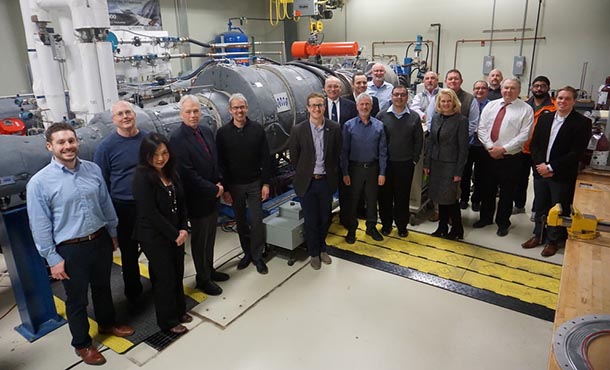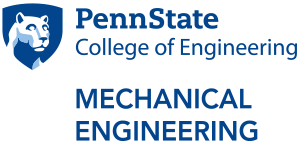
DOE officials visited the Penn State Steady Thermal Aero Research Turbine Lab on May 31, 2019. IMAGE: PENN STATE
START Lab awarded $6 million to develop national experimental turbine
Collaborative turbine design to increase sustainability, security of the nation's energy infrastructure
9/5/2019
By Erin Cassidy Hendrick
UNIVERSITY PARK, Pa. — With industry support, the Department of Energy’s National Energy Technology Lab (DOE-NETL) has awarded the Penn State Steady Thermal Aero Research Turbine (START) Lab $6 million to spearhead the development of a National Experimental Turbine (NExT) rig, an initiative to help modernize the nation’s energy infrastructure.
“This project is truly a new frontier,” said Karen Thole, the director of the START Lab, distinguished professor, mechanical engineering department head and principal investigator of the project. “While most turbine geometries are highly proprietary, the goal for NExT is to provide a modern turbine design that can be used by several organizations. This collaboration will lead to higher-efficiency engines. The experiments and data from NExT will help our industry partners design more cost-effective and environmentally-conscious gas turbines.”
Gas turbines represent a critical technology for energy conversion, with broad uses for combined cycle power plants, aircraft propulsion, gas compression and back-up power generation for renewable plants and hospitals. The technology also plays an important role in U.S. energy security, which requires increased capacity and flexibility to integrate more domestically produced energy resources, such as natural gas, rather than relying on oil from international sources to power the energy grids and pipeline networks of the future.
In addition, technological strides in this field can have wide-reaching economic and environmental effects. According to data presented at the 2019 American Society of Mechanical Engineers TurboExpo, improvement by one point in U.S turbine efficiency adds $7 billion of economic benefit and, in terms of CO2 reduction, is equivalent to removing 2 million cars from the road. Despite the rapid increase in renewable energy resources being adopted in the U.S., gas turbines continue to play a critical role in producing electricity during peak hours and when renewables are not available.
Together, gas turbine markets for aviation and power generation applications represent more than $4.5 trillion in potential revenue over the next 20 years in the U.S. These combined cycle gas turbine plants are expected to supply roughly 60 percent of new power generation capacity through 2035.
Under the START Lab’s leadership, NExT will be a turbine testing platform focused on U.S. technology advancement, designed in collaboration with four turbine manufacturers — Honeywell, Pratt & Whitney, Solar, and Siemens — in partnership with Agilis, a turbine design firm. DOE-NETL will provide $4.6 million to the project, with the remainder coming from the collaborating partners.
“This is an important and exciting project,” said Richard A. Dennis, technology manager of the Advanced Turbines Program in the Office of Fossil Energy at the DOE-National Energy Technology Laboratory. “START and the NExt initiative will advance turbine technology, develop new instrumentation and create high-fidelity analytical data sets. These data sets will support the development of computational models, machine learning and deepen our understanding of turbine performance.”
In this collaboration, the NExT rig will become a common design that can be used quickly and relatively inexpensively by these collaborating companies to advance their turbines.
“For example, in the START lab, we currently have a proprietary turbine design,” Thole said. “The NExT rig will provide a testing platform for all the companies in the partnership to innovate the nation’s next generation of gas turbines.”
NExT will make use of the START infrastructure, previously supported by DOE-NETL and Pratt & Whitney. The unique steady flow testing capabilities and instrumentation will provide the needed capabilities to acquire highly accurate and time-resolved data.
The START Lab also plans to collaborate with other universities to incorporate the NExT geometry in future research activities. Through the development of the NExT rig, according to Thole, new and innovative pathways for future gas turbine research will be possible in the START Lab and around the nation.
About the START Lab
In 2012, the START Lab was founded in the Penn State Department of Mechanical Engineering through a partnership with the DOE-NETL and the United Technologies Corporation-Pratt & Whitney. The unique turbine testing facility currently houses a proprietary turbine design to perform turbine heat transfer studies, along with instrumentation development and integration of additive manufacturing in turbine research.
Penn State has a long history in contributing to the development of gas turbine engines. Relevant research areas at the University that contribute to advancing gas turbines include: combustion, noise, additive manufacturing, materials and coatings, turbine cooling, aerodynamics, sensors, and computational methods. Strong support of Penn State’s research in gas turbines is demonstrated through two previously designated industry centers of excellence: United Technologies Corporation-Pratt & Whitney and Solar Turbines.


